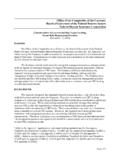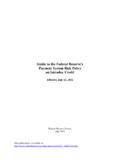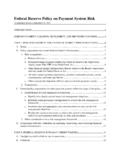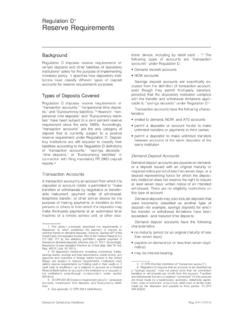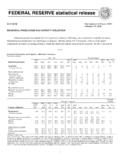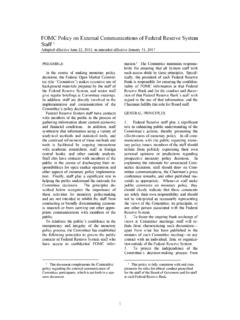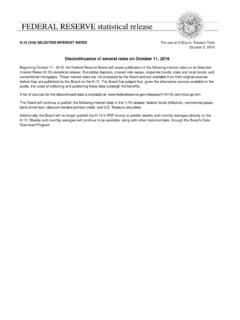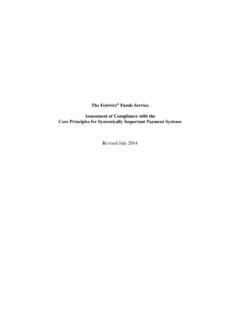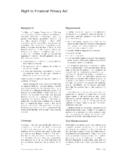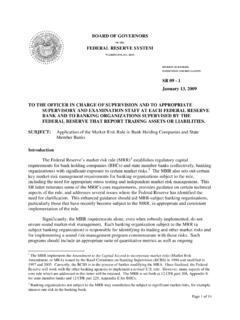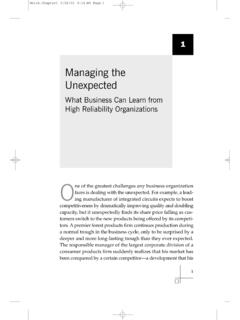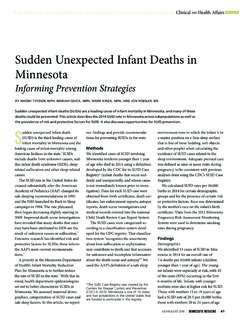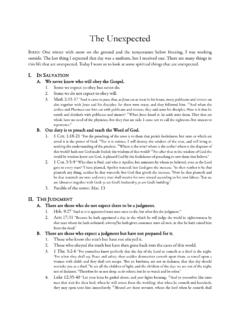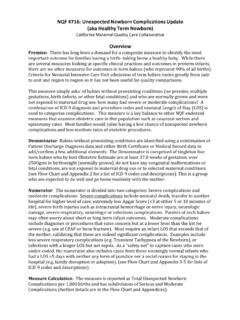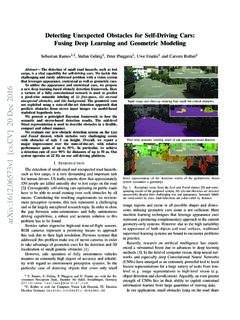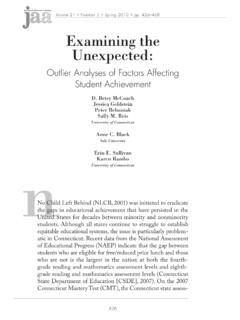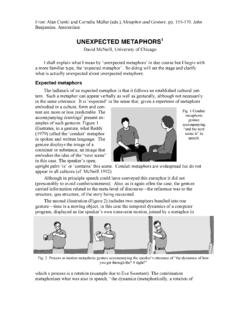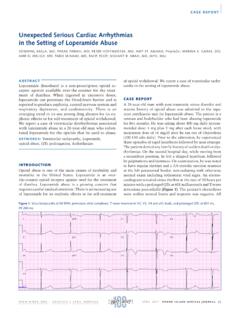Transcription of Proposed Treatment of Expected and Unexpected Losses …
1 Office of the Comptroller of the Currency Board of Governors of the Federal Reserve System Federal Deposit Insurance Corporation Office of Thrift Supervision Proposed Treatment of Expected and Unexpected Losses Under the New Basel Capital Accord October 30, 2003 On October 11, 2003, the Basel Committee on Banking Supervision (Committee) issued a press release describing its progress in moving towards a New Basel Capital Accord. The press release articulated possible changes from and enhancements to the Committee s Third Consultative Paper in response to public comments. Most significantly, in an attachment to the press release, the Committee described potential changes to the framework of the internal ratings-based (IRB) approach to credit risk.
2 The Third Consultative Paper s framework incorporated both Expected and Unexpected loss components into the IRB capital requirement. Based on comments received, the Committee now believes that a separation of the Treatment of Unexpected Losses (UL) and Expected Losses (EL) within the IRB approach would lead to a superior framework. Under this modified approach, the measurement of risk-weighted assets (and the resulting IRB capital requirement) would be based solely on the UL portion of the IRB calculations. Certain offsets within the IRB framework, especially including future margin income, would no longer be necessary. In view of the important implications of these decisions, the Committee is requesting public comment on this Proposed modification to its framework by December 31, 2003.
3 The Committee s document describing this Proposed change is attached to this statement. The Committee s complete press release and the Third Consultative Paper are available on the Basel Committee s Web site at The OCC, FRB, FDIC, and OTS (Agencies) are currently seeking comment on a Proposed framework for implementing the New Basel Capital Accord in the United States. See 68 Fed. Reg. 45900 (August 4, 2003). The Agencies advance notice of proposal rulemaking (ANPR) on this framework is open for comment until November 3, 2003. Among the issues on which the Agencies have sought specific public comment is the Treatment of EL in the Advanced IRB (A IRB) capital regime. Specifically, the Agencies asked: Should the A-IRB capital regime be based on a framework that allocates capital to EL plus UL, or to UL only?
4 Which approach would more closely align the regulatory framework to the internal capital allocation techniques currently used by - 2 -large institutions? If the framework were recalibrated solely to UL, modifications to the rest of the A-IRB framework would be required. The Agencies seek commenters views on issues that would arise as a result of such recalibration. (68 Fed. Reg. at 45911). The attached document from the Committee directly addresses the EL/UL issue on which the Agencies sought public comment in the ANPR. The Agencies continue to seek public comment on this and other issues as part of the ANPR. Interested persons are encouraged to review and comment on both the ANPR and the attached document. As noted above, the Agencies seek comment on the ANPR through November 3, 2003.
5 The Agencies will also consider comments on the Proposed Treatment of EL plus UL received through December 31, 2003, whether those comments are received directly by the Agencies or by the Committee. Comments to the Agencies should be forwarded to the locations noted in the ANPR. Comments to the Basel Committee may be sent via e-mail to or to: Basel Committee on Banking Supervision Bank for International Settlements CH-4002, Basel, Switzerland. Comments and questions about the Proposed Treatment of Expected and Unexpected Losses may be directed to: OCC: Roger Tufts at (202) 874-4925 or FRB: Barbara Bouchard at (202) 452-3072 or FDIC: Jason Cave at (202) 898-3548 or OTS: Fred Phillips-Patrick (202) 906-7295 or Attachment October 11, 2003 Attachment to Press Release Issued by the Basel Committee on Banking Supervision Proposed Treatment of Expected and Unexpected Losses On the basis of its public consultation process, the Basel Committee is convinced that a major improvement in the New Accord is possible in relation to the Treatment of Expected Losses .
6 This note summarises the conclusions that the Committee has reached in this regard. In light of the value that the Committee places on transparency and public consultation, as well as important implications of these decisions, the Committee is requesting public comment on this Proposed modification to its framework by 31 December 2003. The internal ratings-based ( IRB ) approach produces a statistical measurement of both the Unexpected Losses and the Expected Losses that banks face in relation to their credit risk exposures. The Third Consultative Paper s ( CP3 ) framework incorporated both Expected and Unexpected loss components into the IRB capital requirement.
7 The Committee now believes that a separation of the Treatment of Unexpected and Expected Losses within the IRB approach would lead to a superior and more consistent framework. Under this modified approach, the measurement of risk-weighted assets (that is, the IRB capital requirement) would be based solely on the Unexpected loss portion of the IRB calculations. Accordingly, certain offsets within the IRB framework, in particular future margin income, would no longer be necessary. Importantly, however, the Committee believes that it is critical to put into place a separate Treatment of Expected Losses with the objective of ensuring strong incentives for banks to provision properly against Expected Losses .
8 Under this separate Treatment , banks will compare the IRB measurement of Expected Losses with the total amount of provisions that they have made, including both general and specific provisions. For any individual bank, this comparison will produce a shortfall if the Expected loss amount exceeds the total provision amount, or an excess if the total provision amount exceeds the Expected loss amount. The Committee is proposing that shortfall amounts, if any, be deducted from capital. This deduction would be taken 50% from Tier One capital and 50% from Tier Two capital, in line with other deductions from capital included in the New Accord. Excess provision amounts, if any, are Proposed to be eligible as an element of Tier Two capital, similar to the current Treatment of general provisions.
9 The Tier Two eligibility of such excess amounts is further Proposed to be subject to limitation at supervisory discretion, but in no case would be allowed to exceed 20% of Tier Two capital of a bank. In proposing this Treatment , the Committee recognises that banks may have valid reasons for setting provisions in excess of the Expected loss amount calculated by the IRB approach and wishes to avoid discouraging banks from doing so where appropriate. - 2 -This Treatment of shortfall and excess amounts would be in lieu of the current inclusion of general provisions in Tier Two capital. It is important to note that the incorporation of this new approach into the IRB framework may require some re-calibration of that framework to ensure that the overall impact of its proposals is consistent with the Committee s objectives.
10 The Committee is undertaking further efforts to identify where such adjustments may be needed. Although the Committee does not believe that adjustments to the standardised approach to credit risk are necessary in conjunction with this proposal, the Committee welcomes comments on this issue. The Committee invites interested parties to provide comment on all aspects of this specific proposal by 31 December 2003 to relevant national supervisory authorities and central banks and may also be sent to the Basel Committee on Banking Supervision at the Bank for International Settlements, CH-4002, Basel, Switzerland. Comments are also invited by e- mail: or by fax: 41 61 280 9100, and should be directed to the attention of the Basel Committee Secretariat.
